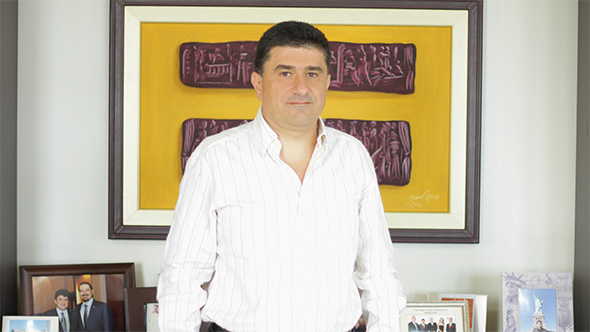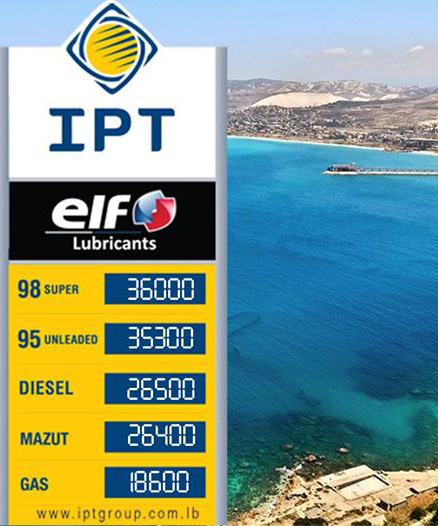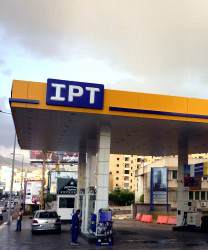IPT: Oil and Gas Sector in Lebanon Has a Promising Future
IPT is mostly involved in the import, storage and distribution of gasoline and diesel and many other related petroleum derivatives. When people think of the oil and gas sector in Lebanon, they directly think about the downstream market. Even though Lebanon has not set a foot into the upstream market yet, it is considered a promising market for the future.
Interview with Toni Issa, Vice Chairman & CEO of IPT

Please give us a brief introduction about IPT, such as the history of the company, the services you provide, countries you are present in, number of employees etc.
IPT is a Lebanese company; it’s a family-owned business. I am representing the second generation of the company. IPT was founded in 1987 by my father MichelIssa, who is still the chairman of the company. We are mostly involved in the import, storage and distribution of gasoline and diesel and many other related petroleum derivatives. We do’ have any presence outside of Lebanon yet. We are mostly focusing in the Lebanese market. We have a market share of almost 8% in gasoline and diesel. We have about 300 employees working in the company.
What is your assessment of the oil and gas sector in Lebanon?
When we speak about the oil and gas sector in Lebanon, we directly think about the downstream market. Even though Lebanon has not set a foot into the upstream market yet, it is considered a promising market for the future. We do talk about the upstream a lot lately and a lot of preparations are being made in this regard, however, throughout the history of the oil and gas sector in Lebanon and until now the market has always been restricted to the downstream sector only. According to the Lebanese criteria, we can state that the oil and gas sector in Lebanon is relatively profitable as most companies are doing reasonably well when compared to other sectors that are suffering from the unstable political situation and security issues prevailing in the country. Still, the oil and gas sector in Lebanon faces a lot of challenges because it is a semi-regulated sector. Although importation is open for the private sector, it is however controlled by the Ministry of Energy and Water which sets the prices on a weekly basis through what we call a ‘price structure’, meaning that the sector is not completely free (..). The demand has been fluctuating over the past few years because of the internal situation. The total consumption in Lebanon is estimated at about 6.5 million metric tons in 2013.
What are IPT’s biggest challenges being in Lebanon or in the region in general?
Working in a business environment similar to that in Lebanon and in many other countries is challenging and risky. There are common challenges for all sectors like the sector of tourism, banking, industries and others. In addition to those challenges, there are others that are specific to the petroleum or oil and gas sector. As I mentioned before, we are working in an industry towards which the government has’ got a clear long-term vision. Moreover, some questions have no clear answers: what is the future of the oil and gas sector in Lebanon? Will it remain controlled by the private sector or will it be controlled by the government? These matters are not clear yet. The petroleum industry is highly capital-intensive. It requires a lot of investment that we are obliged to do, but at the same time we do’ have a long-term vision. Thus, this is one of our major challenges or risks. We need to keep investing in order to be present despite the situation, but we do’ know whether there is a future for this sector in Lebanon or what the future of this sector would be.
This region is known for its oil and gas sector, so how do you set yourself apart from competitors?
I have to compare IPT with other local companies, because we do’ have any presence outside Lebanon. Most of the Lebanese companies working in the oil sector in Lebanon are more or less comparable, because most of them are local companies owned by families. The only international presence in this sector is through Total; all other companies are either local companies or owned by investors from the Gulf region. How we differentiate ourselves in comparison to others in the market? We are a family-owned business that believes in Lebanon where we have been investing for years and where we believe we will remain in the long run. That’s why we do’ apply traditional business principles when it comes to investments. We always look forward. We consider that what we do now has to last for many years in the future. This is why it’s not always easy to invest and to have returns that are not proportionate to your investment. The approach we are applying is not restricted to profitability only. So, this is how we see ourselves as a long-term company that believes in staying in Lebanon and in investing in it and that believes in the future of this country as well. Now our aim is to participate and contribute towards the future and the economy of Lebanon. Being Lebanese with deep roots in our country, we want to stay here and improve.
The oil business brings about many concerns regarding the environment. Part of your mission is to strive to be “as green as possible.” How are you doing that?
It is a part of the mission of every company. Every company uses this slogan repeatedly. In order to go green, we need to seriously invest. It is not a matter of adding something to your portfolio or mission statement. So this is why I do’ consider IPT as a real contributor towards becoming a green company yet, because it requires real determination and an intention to invest and to change. But of course this is something that we have seriously considered as an objective or goal that we have been working on. This is why last year we created IPTEC – IPT Energy Centre, which is an IPT research centre aiming at how to actually transform IPT into a green company. We are still in the research phase and have’ reached the implementation phase yet.
Compared to other countries in the region what are the advantages of being in Lebanon and why do you still believe in investing here?
First of all because we are Lebanese, we belong to this country. So, we should believe in investing here. My father created this company during the civil war. He had this willingness and determination to work during the hard and tough times and it is up to us, who belong to the second generation in IPT, to continue what he started. I believe that this country is a huge and beautiful country and we need to realize its importance. This is why we believe that this country has a future and we have to contribute towards its future. Unfortunately, it’s not easy to stay and invest in this hard environment, but we have found this balance to adapt to the circumstances and to develop the ability to work under hard conditions. If you look at the good side of it, whenever you are successful in working in countries like Lebanon, it will be very easy for you to work everywhere else in the world. This is something I realized after meeting many other investors and owners of companies outside of Lebanon. Just because they had an experience of working in Lebanon, they found everything else very easy. So, working in Lebanon and being successful here gives you a lot of knowledge and know-how that can be used in Lebanon and elsewhere. So, if you can make it here, you can make it anywhere.
We have the self-satisfaction and belief that the Lebanese people are very successful everywhere in the world. So, even if the international investors do’ feel confident enough to invest here owing to the current circumstances, it is not the case for the Lebanese investors, because they know the country, the culture and the environment.
How do you see the future evolution of oil prices in the global market?
We read a lot about the forecasts and projections, but what is constant is that the demand is growing everywhere. All the forecasts are common among all the agencies that study the oil sector. So, the sector by itself is promising, and the demand is growing, which means that the growth and demand will increase the prices. This means that we, at IPT, are working in a good sector. It is most likely going to remain like this in the coming years.
What is your vision for the future development of Lebanon and the company?
We have to believe. You know it depends on when you ask this question. Sometimes, when I am a bit depressed, when there are a lot of hurdles, I do’ believe in it. But most of the times, I try to consider that it’s important to believe in the country and to keep investing whenever it is possible. This is how I behave inside the company. This is the message I would like to spread among the people and the team that I work with. I want to make sure that my company sets an example of how companies in Lebanon and how the economy in Lebanon should be. This is why my aim is to transform IPT into an exemplary company; a company that can set an example to others; a company that can work as an honest and professional company. I do’ really need to do a lot of things that I am doing right now in terms of structure, resources and organisation. I do a lot. Nobody is asking me to do it. But I do it, because I believe that it is an image of how the country should be and this is how I exercise my duties in my company, because I believe in it and this is how I think Lebanon should be.
Back in early 2013, it was announced that buried offshore in Lebanon’s section of the Mediterranean are 96 trillion cubic feet of natural gas and about 850m barrels of oil, which would be enough to end power shortages, wipe off Lebanon’s rapidly increasing public debt, and revive its economy. Can you tell us what is new on that front?
Honestly, there is lot of new things to be set. I keep attending workshops and conferences about the most recent developments at this stage. I am not hearing about anything new since a couple of months. This is due to the complicated political situation. From the technical side everything is ready with regards to offshore or to launching the tenders. But at the same time, what is still missing is that there is no political consensus over strategic and futuristic issues. As long as the political situation is not stabilized, I do’ see that this is going to happen very soon. We have to also believe that the discovery of gas is a huge potential for the future of Lebanon and for the coming generations. However, the quantity is not clear yet. There are a lot of speculations over it, but all the studies confirm that it will be very useful for the economy of the country. But of course Lebanon has no experience in this. It’s the first time in the history of Lebanon and we have to learn, we do’ want to rush. We need to be cautious and try to learn from others’ experience. We do’ want to rely a lot and put a lot of expectations on a sector that we do’ know a lot about yet. We do’ want to be manipulated by international oil companies, because we do’ have enough experience. We also do’ want to hurt the remaining sectors, so we should’ pretend that we want to concentrate on the oil and gas sector only and forget and neglect all the others. Therefore, this situation is critical and requires a lot of attention and I think it is better not to rush things. 
Are there any concerns that having discovered this oil, you will have other countries interfering? Or whether the oil would be fairly distributed within Lebanon, is this one of the concerns of the people? Do you think that drilling would bring about some disadvantages for our country?
I do’ think that drilling by itself will bring about any disadvantages, because studies and past events have revealed that sometimes we need to be more cautious about not relying too much on it. Now we are in the process of negotiating agreements with international oil companies. Drilling agreements are usually signed for long-term periods, 25 to 30 years. So, we are committing Lebanon for the coming 30 years. This is something important, and we need to know how to negotiate the terms of the agreements in a way that will not hurt the interests of Lebanon, because on the one hand, it is not a matter of 1 or 2 years, it’s a 30-year contract. On the other hand, we should consider how to locate the resources that might be coming from drilling itself. Is it going to help other sectors or not? How are we going to deal with other sectors in the country? So, it’s not really clear yet. These things have to be well prepared in advance and it is not only the obligation of the Lebanese government alone. It is also the responsibility of the whole community, the economic sector and the research companies to start thinking seriously about all these things, before we reach the stage of starting drilling.
Is there anything you would like to add before we conclude this interview?
I would like to conclude this interview by being optimistic; by trying to invite the Lebanese people to believe in their country and to ensure that even if they decide to leave their country to study or to work abroad, they should keep in mind that they should’ leave with the thought of never returning again. Lebanon is a great country. It’s not easy to live here, but at the same time it’s not impossible. When we go abroad, it is important to keep hoping that “one day we will come back and we will invest in this great country to help it grow and improve”.
You are very optimistic about Lebanon, what about the investors? What would you like to say to the investors to attract them to come to Lebanon?
I encourage the Lebanese investors. We have the self-satisfaction and belief that the Lebanese people are very successful everywhere in the world. So, even if the international investors do’ feel confident enough to invest here owing to the current circumstances, it is not the case for the Lebanese investors, because they know the country, the culture and the environment. So, I encourage the Lebanese investors to come and invest a part of their investment. From my own experience, I know that it is sometimes hard to be successful in Lebanon, but it is not impossible. My company is a good example. My father believed in this country; he has been investing for 35 years and now I am leading the second generation. I am happy with the company. We are doing well and we have plans of expansion to increase our market share and to do more investments and perhaps to also invest in other related and unrelated businesses. We want to remain successful despite all the challenges.